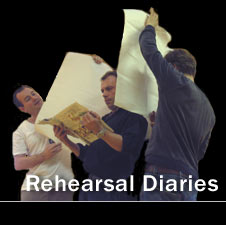Week One "Jump in and make some noise" - the first day Nineteen people are gathered in one of the National Theatre’s Sound rehearsal studios, drinking coffee, chatting and playing around with the technology. Cables snake across the floor linking monitors, projectors, video recorders, microphones, computers, musical instruments and speakers. It’s the first day of seven weeks of rehearsal for a new National Theatre production of The Caucasian Chalk Circle, and the director, Sean Holmes, gathers the group into a circle on the floor, and starts an informal round of introductions. The circle comprises nine performers, two musicians, two video designers, a set designer, a deputy stage manager, a director, an associate director, and two people who are documenting the rehearsal process. Sean says that he doesn’t want to do the “typical first day talk”, nor does he “have sketches and models to show you all.” Often, on first days of rehearsals, the director and the designer(s) offer their overall picture of the production by talking the cast and crew through a model box of the set and samples and sketches of the costuming concepts. But from the outset of this production, it’s evident that we’re all in for a different type of process. The theatre collective also responsible for this production, Filter, have a distinct approach to theatre-making that Ferdy Roberts, one of the performers and founders of Filter, speaks briefly about: “Ollie [Oliver Dimsdale], myself and Tim [Phillips] felt that actors and musicians were not connecting enough in the theatre, and we thought that this was a mistake, so we’ve tried to create works that break down the barriers between these groups.” Ollie adds that “here we have a linear narrative but can present it in kaleidoscopic form… with Chalk Circleit’s all up for grabs, and with this technology and process it could be more “Brecht” than Brecht, revealing all the cogs, visually and sonically.” Sean, who has worked with Filter before, says “coming from a perspective where the writing is the primary text, and the playwright the primary author, the Filter process is quite exciting… it’s a way to release everyone’s imagination. I don’t have a total vision for this show, and for as long as possible I want to keep it open and free. So for today, we’re not going to do a read-through: the best things to do are just jump in, make some noise – and look at the script tomorrow.” Rehearsal diary written by Annette Vieusseux for Stagework | | |

